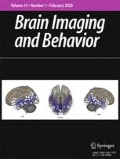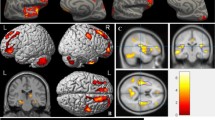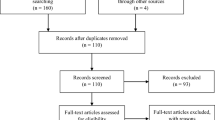Abstract
Cognitive changes in patients undergoing treatment for non-central nervous system (CNS) cancers have been recognized for several decades, yet the underlying mechanisms are not well understood. Structural, functional and molecular neuroimaging has the potential to help clarify the neural bases of these cognitive abnormalities. Structural magnetic resonance imaging (MRI), functional MRI (fMRI), diffusion tensor imaging (DTI), MR spectroscopy (MRS), and positron emission tomography (PET) have all been employed in the study of cognitive effects of cancer treatment, with most studies focusing on breast cancer and changes thought to be induced by chemotherapy. Articles in this special issue of Brain Imaging and Behavior are devoted to neuroimaging studies of cognitive changes in patients with non-CNS cancer and include comprehensive critical reviews and novel research findings. The broad conclusions that can be drawn from past studies and the present body of new research is that there are structural and functional changes associated with cancer and various treatments, particularly systemic cytotoxic chemotherapy, although some cognitive and fMRI studies have identified changes at pre-treatment baseline. Recommendations to accelerate progress include well-powered multicenter neuroimaging studies, a better standardized definition of the cognitive phenotype and extension to other cancers. A systems biology framework incorporating multimodality neuroimaging, genetics and other biomarkers will be highly informative regarding individual differences in risk and protective factors and disease- and treatment-related mechanisms. Studies of interventions targeting cognitive changes are also needed. These next steps are expected to identify novel protective strategies and facilitate a more personalized medicine for cancer patients.
Similar content being viewed by others
References
Ahles, T. A., & Saykin, A. J. (2007). Candidate mechanisms for chemotherapy-induced cognitive changes. Nature Reviews Cancer, 7(3), 192–201. doi:10.1038/nrc2073.
Ahles, T. A., Saykin, A. J., Noll, W. W., Furstenberg, C. T., Guerin, S., Cole, B., et al. (2003). The relationship of APOE genotype to neuropsychological performance in long-term cancer survivors treated with standard dose chemotherapy. Psychooncology, 12(6), 612–619. doi:10.1002/pon.742.
Ahles, T. A., Saykin, A. J., McDonald, B. C., Furstenberg, C. T., Cole, B. F., Hanscom, B. S., et al. (2008). Cognitive function in breast cancer patients prior to adjuvant treatment. Breast Cancer Research and Treatment, 110(1), 143–152. doi:10.1007/s10549-007-9686-5.
Ahles, T. A., Root, J. C., & Ryan, E. L. (2012). Cancer- and cancer treatment-associated cognitive change: an update on the state of the science. Journal of Clinical Oncology, 30(30), 3675–3686. doi:10.1200/JCO.2012.43.0116.
American Psychiatric Association. (2013). Diagnostic and Statistical Manual of Mental Disorders (DSM-5).
Anderson-Hanley, C., Sherman, M. L., Riggs, R., Agocha, V. B., & Compas, B. E. (2003). Neuropsychological effects of treatments for adults with cancer: a meta-analysis and review of the literature. Journal of International Neuropsychological Society, 9(7), 967–982. doi:10.1017/S1355617703970019.
Arndt, J., Das, E., Schagen, S. B., Reid-Arndt, S. A., Cameron, L. D., & Ahles, T. A. (2013). Broadening the cancer and cognition landscape: the role of self-regulatory challenges. Psychooncology. doi:10.1002/pon.3351.
Bruno, J., Hosseini, S. M., & Kesler, S. (2012). Altered resting state functional brain network topology in chemotherapy-treated breast cancer survivors. Neurobiology of Disease, 48(3), 329–338. doi:10.1016/j.nbd.2012.07.009.
Cimprich, B., Reuter-Lorenz, P., Nelson, J., Clark, P. M., Therrien, B., Normolle, D., et al. (2010). Prechemotherapy alterations in brain function in women with breast cancer. Journal of Clinical and Experimental Neuropsychology, 32(3), 324–331. doi:10.1080/13803390903032537.
Conroy, S. K., McDonald, B. C., O’Neill, D. P., & Saykin, A. J. (2012). Neuroimaging in cancer and oncology. In C. A. Noggle & R. S. Dean (Eds.), The Neuropsychology of Cancer and Oncology (pp. 235–260): Springer.
Conroy, S. K., McDonald, B. C., Ahles, T. A., West, J. D., & Saykin, A. J. (2013a). Chemotherapy-induced amenorrhea: a prospective study of brain activation changes and neurocognitive correlates. Brain Imaging Behav. doi:10.1007/s11682-013-9240-5
Conroy, S. K., McDonald, B. C., Smith, D. J., Moser, L. R., West, J. D., Kamendulis, L. M., et al. (2013b). Alterations in brain structure and function in breast cancer survivors: effect of post-chemotherapy interval and relation to oxidative DNA damage. Breast Cancer Research and Treatment, 137(2), 493–502. doi:10.1007/s10549-012-2385-x.
Correa, D. D., Root, J. C., Baser, R., Moore, D., Peck, K. K., Lis, E. et al. (2013). A prospective evaluation of changes in brain structure and cognitive functions in adult stem cell transplant recipients. Brain Imaging Behav. doi:10.1007/s11682-013-9221-8
de Ruiter, M. B., & Schagen, S. B. (2013). Functional MRI studies in non-CNS cancers. Brain Imaging Behav, 1–21. doi:10.1007/s11682-013-9249-9
de Ruiter, M. B., Reneman, L., Boogerd, W., Veltman, D. J., van Dam, F. S., Nederveen, A. J., et al. (2011). Cerebral hyporesponsiveness and cognitive impairment 10 years after chemotherapy for breast cancer. Human Brain Mapping, 32(8), 1206–1219. doi:10.1002/hbm.21102.
de Ruiter, M. B., Reneman, L., Boogerd, W., Veltman, D. J., Caan, M., Douaud, G., et al. (2012). Late effects of high-dose adjuvant chemotherapy on white and gray matter in breast cancer survivors: converging results from multimodal magnetic resonance imaging. Human Brain Mapping, 33(12), 2971–2983. doi:10.1002/hbm.21422.
Deprez, S., Amant, F., Yigit, R., Porke, K., Verhoeven, J., Van den Stock, J., et al. (2011). Chemotherapy-induced structural changes in cerebral white matter and its correlation with impaired cognitive functioning in breast cancer patients. Human Brain Mapping, 32(3), 480–493. doi:10.1002/hbm.21033.
Deprez, S., Billiet, T., Sunaert, S., & Leemans, A. (2013). Diffusion tensor MRI of chemotherapy-induced cognitive impairment in non-CNS cancer patients: a review. Brain Imaging and Behavior. doi:10.1007/s11682-012-9220-1.
Dumas, J. A., Makarewicz, J., Schaubhut, G. J., Devins, R., Albert, K., Dittus, K., et al. (2013). Chemotherapy altered brain functional connectivity in women with breast cancer: a pilot study. Brain Imaging and Behavior. doi:10.1007/s11682-013-9244-1.
Ercoli, L. M., Castellon, S. A., Hunter, A. M., Kwan, L., Kahn-Mills, B. A., Cernin, P. A. et al. (2013). Assessment of the feasibility of a rehabilitation intervention program for breast cancer survivors with cognitive complaints. Brain Imaging Behav, 1–11. doi:10.1007/s11682-013-9237-0
Falleti, M. G., Sanfilippo, A., Maruff, P., Weih, L., & Phillips, K. A. (2005). The nature and severity of cognitive impairment associated with adjuvant chemotherapy in women with breast cancer: a meta-analysis of the current literature. Brain and Cognition, 59(1), 60–70. doi:10.1016/j.bandc.2005.05.001.
Ferguson, R. J., McDonald, B. C., Saykin, A. J., & Ahles, T. A. (2007). Brain structure and function differences in monozygotic twins: possible effects of breast cancer chemotherapy. Journal of Clinical Oncology, 25(25), 3866–3870. doi:10.1200/JCO.2007.10.8639.
Ganz, P. A., Bower, J. E., Kwan, L., Castellon, S. A., Silverman, D. H., Geist, C., et al. (2013). Does tumor necrosis factor-alpha (TNF-alpha) play a role in post-chemotherapy cerebral dysfunction? Brain Behav Immun. Suppl, 30, S99–S108. doi:10.1016/j.bbi.2012.07.015.
Hodgson, K. D., Hutchinson, A. D., Wilson, C. J., & Nettelbeck, T. (2013). A meta-analysis of the effects of chemotherapy on cognition in patients with cancer. Cancer Treatment Reviews, 39(3), 297–304. doi:10.1016/j.ctrv.2012.11.001.
Holohan, K. N., Lahiri, D. K., Schneider, B. P., Foroud, T., & Saykin, A. J. (2012). Functional microRNAs in Alzheimer's disease and cancer: differential regulation of common mechanisms and pathway. Frontiers in Genetics, 3, 323. doi:10.3389/fgene.2012.00323.
Holohan, K. N., Von Ah, D., McDonald, B. C., & Saykin, A. J. (2013a). Neuroimaging, cancer, and cognition: state of the knowledge. Seminars in Oncology Nursing, 29(4), 280–287. doi:10.1016/j.soncn.2013.08.008.
Holohan, K., Wang, Y., McDonald, B., Conroy, S., Smith, D., West, J., et al. (2013b). Cerebral perfusion and cognition after breast cancer chemotherapy: A prospective PASL MRI study. Poster presented at the Annual Meeting of the Organization for Human Brain Mapping, June 16–20, 2013, Seattle, WA.
Hosseini, S. M., Koovakkattu, D., & Kesler, S. R. (2012). Altered small-world properties of gray matter networks in breast cancer. BMC Neurology, 12, 28. doi:10.1186/1471-2377-12-28.
Inagaki, M., Yoshikawa, E., Matsuoka, Y., Sugawara, Y., Nakano, T., Akechi, T., et al. (2007). Smaller regional volumes of brain gray and white matter demonstrated in breast cancer survivors exposed to adjuvant chemotherapy. Cancer, 109(1), 146–156. doi:10.1002/cncr.22368.
Jansen, C. E., Miaskowski, C. A., Dodd, M. J., & Dowling, G. A. (2007). A meta-analysis of the sensitivity of various neuropsychological tests used to detect chemotherapy-induced cognitive impairment in patients with breast cancer. Oncology Nursing Forum, 34(5), 997–1005. doi:10.1188/07.ONF.997-1005.
Jim, H. S., Phillips, K. M., Chait, S., Faul, L. A., Popa, M. A., Lee, Y. H., et al. (2012). Meta-analysis of cognitive functioning in breast cancer survivors previously treated with standard-dose chemotherapy. Journal of Clinical Oncology, 30(29), 3578–3587. doi:10.1200/JCO.2011.39.5640.
Kesler, S. R., Bennett, F. C., Mahaffey, M. L., & Spiegel, D. (2009). Regional brain activation during verbal declarative memory in metastatic breast cancer. Clinical Cancer Research, 15(21), 6665–6673. doi:10.1158/1078-0432.CCR-09-1227.
Kesler, S. R., Kent, J. S., & O'Hara, R. (2011). Prefrontal cortex and executive function impairments in primary breast cancer. Archives of Neurology, 68(11), 1447–1453. doi:10.1001/archneurol.2011.245.
Kesler, S. R., Janelsins, M., Koovakkattu, D., Palesh, O., Mustian, K., Morrow, G., et al. (2013a). Reduced hippocampal volume and verbal memory performance associated with interleukin-6 and tumor necrosis factor-alpha levels in chemotherapy-treated breast cancer survivors. Brain, Behavior, and Immunity, 30(Suppl), S109–S116. doi:10.1016/j.bbi.2012.05.017.
Kesler, S. R., Watson, C., Koovakkattu, D., Lee, C., O'Hara, R., Mahaffey, M. L., et al. (2013b). Elevated prefrontal myo-inositol and choline following breast cancer chemotherapy. Brain Imaging and Behavior. doi:10.1007/s11682-013-9228-1.
Kim, L. S., Hwang, H. S., Jon, D. I., Ham, B. J., & Seok, J. H. (2008). Dysfunction of the neural network associated with sustained attention in cancer patients with clinically significant depressive symptoms. Neuroscience Letters, 447(1), 1–6. doi:10.1016/j.neulet.2008.09.077.
Koppelmans, V., de Ruiter, M. B., van der Lijn, F., Boogerd, W., Seynaeve, C., van der Lugt, A., et al. (2012a). Global and focal brain volume in long-term breast cancer survivors exposed to adjuvant chemotherapy. Breast Cancer Research and Treatment, 132(3), 1099–1106. doi:10.1007/s10549-011-1888-1.
Koppelmans, V., Groot, M. D., de Ruiter, M. B., Boogerd, W., Seynaeve, C., Vernooij, M. W., et al. (2012b). Global and focal white matter integrity in breast cancer survivors 20 years after adjuvant chemotherapy. Human Brain Mapping. doi:10.1002/hbm.22221.
Kroenke, C. H., Kubzansky, L. D., Schernhammer, E. S., Holmes, M. D., & Kawachi, I. (2006). Social networks, social support, and survival after breast cancer diagnosis. Journal of Clinical Oncology, 24(7), 1105–1111. doi:10.1200/jco.2005.04.2846.
Lopez Zunini, R. A., Scherling, C., Wallis, N., Collins, B., Mackenzie, J., Bielajew, C., et al. (2012). Differences in verbal memory retrieval in breast cancer chemotherapy patients compared to healthy controls: a prospective fMRI study. Brain Imaging and Behavior. doi:10.1007/s11682-012-9213-0.
Mandelblatt, J. S., Hurria, A., McDonald, B. C., Saykin, A. J., Stern, R. A., VanMeter, J. W., . . . For the TLC Study (Thinking and Living with Cancer). (2013, in press). Cognitive effects of cancer and its treatments at the intersection of aging: What do we know; What do we need to know? Seminars in Oncology.
McAllister, T. W., Ahles, T. A., Saykin, A. J., Ferguson, R. J., McDonald, B. C., Lewis, L. D., et al. (2004). Cognitive effects of cytotoxic cancer chemotherapy: predisposing risk factors and potential treatments. Current Psychiatry Reports, 6(5), 364–371.
McDonald, B. C., & Saykin, A. J. (2011). Neurocognitive dimensions of breast cancer and its treatment. Neuropsychopharmacology, 36(1), 355–356. doi:10.1038/npp.2010.142.
McDonald, B. C., & Saykin, A. J. (2013). Alterations in brain structure related to breast cancer and its treatment: chemotherapy and other considerations. Brain Imaging Behav, 1–14. doi:10.1007/s11682-013-9256-x
McDonald, B. C., Conroy, S. K., Ahles, T. A., West, J. D., & Saykin, A. J. (2010). Gray matter reduction associated with systemic chemotherapy for breast cancer: a prospective MRI study. Breast Cancer Research and Treatment, 123(3), 819–828. doi:10.1007/s10549-010-1088-4.
McDonald, B. C., Conroy, S. K., Ahles, T. A., West, J. D., & Saykin, A. J. (2012). Alterations in brain activation during working memory processing associated with breast cancer and treatment: a prospective functional magnetic resonance imaging study. Journal of Clinical Oncology, 30(20), 2500–2508. doi:10.1200/JCO.2011.38.5674.
McDonald, B. C., Conroy, S. K., Smith, D. J., West, J. D., & Saykin, A. J. (2013). Frontal gray matter reduction after breast cancer chemotherapy and association with executive symptoms: a replication and extension study. Brain, Behavior, and Immunity, 30(Suppl), S117–S125. doi:10.1016/j.bbi.2012.05.007.
Myers, J. S. (2010). The possible role of cytokines in chemotherapy-induced cognitive deficits. Advances in Experimental Medicine and Biology, 678, 119–123.
Nelson, W. L., & Suls, J. (2013). New approaches to understand cognitive changes associated with chemotherapy for non-central nervous system tumors. Journal of Pain and Symptom Management, 46(5), 707–721. doi:10.1016/j.jpainsymman.2012.11.005.
Pomykala, K. L., de Ruiter, M. B., Deprez, S., McDonald, B. C., & Silverman, D. H. (2013a). Integrating imaging findings in evaluating the post-chemotherapy brain. Brain Imaging and Behavior. doi:10.1007/s11682-013-9239-y.
Pomykala, K. L., Ganz, P. A., Bower, J. E., Kwan, L., Castellon, S. A., Mallam, S., et al. (2013b). The association between pro-inflammatory cytokines, regional cerebral metabolism, and cognitive complaints following adjuvant chemotherapy for breast cancer. Brain Imaging and Behavior. doi:10.1007/s11682-013-9243-2.
Risacher, S. L., Kim, S., Shen, L., Nho, K., Foroud, T., Green, R. C., et al. (2013). The role of apolipoprotein E (APOE) genotype in early mild cognitive impairment (E-MCI). Frontiers in Aging Neuroscience, 5, 11. doi:10.3389/fnagi.2013.00011.
Saykin, A. J., Ahles, T. A., & McDonald, B. C. (2003). Mechanisms of chemotherapy-induced cognitive disorders: neuropsychological, pathophysiological, and neuroimaging perspectives. Seminars in Clinical Neuropsychiatry, 8(4), 201–216.
Saykin, A. J., Shen, L., Foroud, T. M., Potkin, S. G., Swaminathan, S., Kim, S., et al. (2010). Alzheimer's Disease Neuroimaging Initiative biomarkers as quantitative phenotypes: Genetics core aims, progress, and plans. Alzheimers Dement, 6(3), 265–273. doi:10.1016/j.jalz.2010.03.013.
Scherling, C., Collins, B., Mackenzie, J., Bielajew, C., & Smith, A. (2011). Pre-chemotherapy differences in visuospatial working memory in breast cancer patients compared to controls: an FMRI study. Frontiers in Human Neuroscience, 5, 122. doi:10.3389/fnhum.2011.00122.
Scherling, C., Collins, B., Mackenzie, J., Bielajew, C., & Smith, A. (2012). Prechemotherapy differences in response inhibition in breast cancer patients compared to controls: a functional magnetic resonance imaging study. Journal of Clinical and Experimental Neuropsychology, 34(5), 543–560. doi:10.1080/13803395.2012.666227.
Seigers, R., Schagen, S. B., Van Tellingen, O., & Dietrich, J. (2013). Chemotherapy-related cognitive dysfunction: current animal studies and future directions. Brain Imaging Behav, 1–7. doi:10.1007/s11682-013-9250-3
Shen, L., Thompson, P. M., Potkin, S. G., Bertram, L., Farrer, L. A., Foroud, T. M., et al. (2013). Genetic analysis of quantitative phenotypes in AD and MCI: imaging, cognition and biomarkers. Brain Imaging and Behavior. doi:10.1007/s11682-013-9262-z.
Silverman, D. H., Dy, C. J., Castellon, S. A., Lai, J., Pio, B. S., Abraham, L., et al. (2007). Altered frontocortical, cerebellar, and basal ganglia activity in adjuvant-treated breast cancer survivors 5–10 years after chemotherapy. Breast Cancer Research and Treatment, 103(3), 303–311. doi:10.1007/s10549-006-9380-z.
Silverman, D. H., Mosconi, L., Ercoli, L., Chen, W., & Small, G. W. (2008). Positron emission tomography scans obtained for the evaluation of cognitive dysfunction. Seminars in Nuclear Medicine, 38(4), 251–261. doi:10.1053/j.semnuclmed.2008.02.006.
Small, B. J., Rawson, K. S., Walsh, E., Jim, H. S., Hughes, T. F., Iser, L., et al. (2011). Catechol-O-methyltransferase genotype modulates cancer treatment-related cognitive deficits in breast cancer survivors. Cancer, 117(7), 1369–1376. doi:10.1002/cncr.25685.
Sporns, O. (2013a). The human connectome: origins and challenges. NeuroImage, 80, 53–61. doi:10.1016/j.neuroimage.2013.03.023.
Sporns, O. (2013b). Structure and function of complex brain networks. Dialogues in Clinical Neuroscience, 15(3), 247–262.
Sporns, O., Tononi, G., & Kotter, R. (2005). The human connectome: a structural description of the human brain. PLoS Computational Biology, 1(4), e42. doi:10.1371/journal.pcbi.0010042.
Stewart, A., Bielajew, C., Collins, B., Parkinson, M., & Tomiak, E. (2006). A meta-analysis of the neuropsychological effects of adjuvant chemotherapy treatment in women treated for breast cancer. Clinical Neuropsychology, 20(1), 76–89. doi:10.1080/138540491005875.
Tannock, I. F., Ahles, T. A., Ganz, P. A., & Van Dam, F. S. (2004). Cognitive impairment associated with chemotherapy for cancer: report of a workshop. Journal of Clinical Oncology, 22(11), 2233–2239. doi:10.1200/JCO.2004.08.094.
Versace, F., Engelmann, J. M., Jackson, E. F., Slapin, A., Cortese, K. M., Bevers, T. B. et al. (2013). Brain responses to erotic and other emotional stimuli in breast cancer survivors with and without distress about low sexual desire: a preliminary fMRI study. Brain Imaging Behav, 1–10. doi:10.1007/s11682-013-9252-1
Vodermaier, A. (2009). Breast cancer treatment and cognitive function: the current state of evidence, underlying mechanisms and potential treatments. Women's Health (London, England), 5(5), 503–516. doi:10.2217/whe.09.36.
Walker, C. H., Drew, B. A., Antoon, J. W., Kalueff, A. V., & Beckman, B. S. (2012). Neurocognitive effects of chemotherapy and endocrine therapies in the treatment of breast cancer: recent perspectives. Cancer Investigation, 30(2), 135–148. doi:10.3109/07357907.2011.636116.
Wefel, J. S., Lenzi, R., Theriault, R. L., Davis, R. N., & Meyers, C. A. (2004). The cognitive sequelae of standard-dose adjuvant chemotherapy in women with breast carcinoma: results of a prospective, randomized, longitudinal trial. Cancer, 100(11), 2292–2299. doi:10.1002/cncr.20272.
Wefel, J. S., Witgert, M. E., & Meyers, C. A. (2008). Neuropsychological sequelae of non-central nervous system cancer and cancer therapy. Neuropsychology Review, 18(2), 121–131. doi:10.1007/s11065-008-9058-x.
Wefel, J. S., Vardy, J., Ahles, T., & Schagen, S. B. (2011). International Cognition and Cancer Task Force recommendations to harmonise studies of cognitive function in patients with cancer. Lancet Oncology, 12(7), 703–708. doi:10.1016/S1470-2045(10)70294-1.
Weiner, M. W., Veitch, D. P., Aisen, P. S., Beckett, L. A., Cairns, N. J., Green, R. C., et al. (2013). The Alzheimer’s disease neuroimaging initiative: a review of papers published since its inception. Alzheimers Dement, 9(5), e111–e194. doi:10.1016/j.jalz.2013.05.1769.
Acknowledgments
The authors wish to thank the Organizing Committee of the International Cognition and Cancer Task Force (ICCTF; http://www.icctf.com/). This project and special issue are an outgrowth of the Neuroimaging Working Group of the ICCTF. The authors gratefully acknowledge support from the following funding sources. Drs. Saykin and McDonald: Supported in part by the National Cancer Institute (R01 CA101318, P30 CA082709 and R25 CA117865), the National Institute on Aging (R01 AG19771, P30 AG10133), and the National Library of Medicine (R01 LM011360). Dr. de Ruiter: Supported by the Dutch Cancer Society, Grant numbers KWF 2009–4284; KWF 2010–4894; KWF 2012–5495. Dr. Deprez: The Fonds Wetenschappelijk Onderzoek–Vlaanderen (Grant No. G.048010N) and by the Stichting tegen Kanker. Dr. Silverman: National Institute of Neurological Diseases and Stroke (R21 NS071385).
Author information
Authors and Affiliations
Corresponding author
Rights and permissions
About this article
Cite this article
Saykin, A.J., de Ruiter, M.B., McDonald, B.C. et al. Neuroimaging biomarkers and cognitive function in non-CNS cancer and its treatment: Current status and recommendations for future research. Brain Imaging and Behavior 7, 363–373 (2013). https://doi.org/10.1007/s11682-013-9283-7
Published:
Issue Date:
DOI: https://doi.org/10.1007/s11682-013-9283-7




